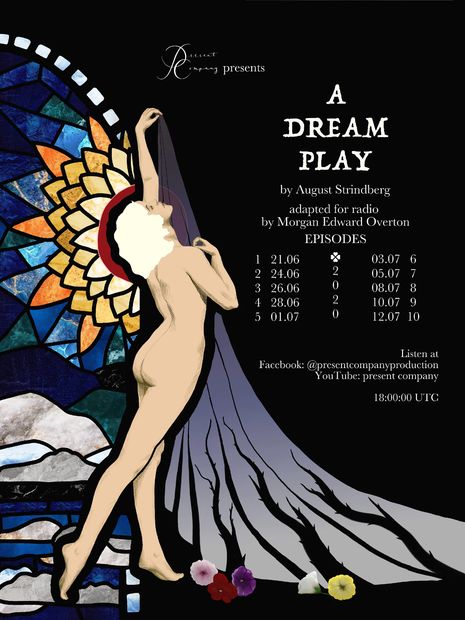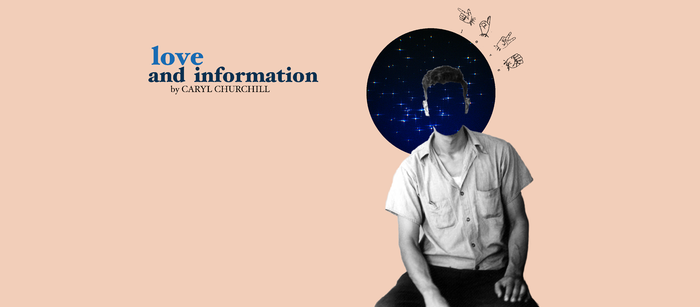A Dream Play: A Play That is ‘Nothing if Not Big’
Co-director and adaptor Morgan Edward Overton discusses bringing Strindberg’s ‘A Dream Play’ to the (virtual) Cambridge stage for the first time ever

A Dream Play is a strange beast. Falling somewhere between naturalist and surrealist, comic and tragic, existentialist and essentialist, Strindberg’s portrait of the human condition is one of his most striking works, and indeed one of the most ambitious plays of the early 20th Century. Our heroine Agnes, the daughter of heaven, comes to earth determined to figure out what humanity is all about. On her journey, she encounters a cavalcade of confusing characters – among them, the Officer, trapped in a castle by his own volition; the Billposter, whose only true love is fishing; the Quarantine Master (very timely), whose line between medical treatment and torture runs dangerously thin; and many others. They all offer up a little piece of the solution. Along the way, she can’t help but feel that these humans really aren’t as happy as they ought to be.
A Dream Play is nothing if not big. A two-hour play with a cast of 35 named characters plus ensemble, songs and choral interludes written into the script, 10 different sets, and time dilation to the point that one character ages 30 years while another ages an hour – these factors all combine to create a kaleidoscopic collage of this world and the people within it. The logic of the universe we find ourselves in is (as the title might suggest) somewhat abstract, with conversation moving laterally as well as linearly, and the register and tone of the language darting all over the place (all of which I only augmented in my version of the script). It certainly leaves an impression.
"Will it be funny? Maybe. Will it be sad? It depends."
With our current isolation seemingly stretching to eternity, a staging of such a piece in any timely fashion had been looking less and less likely, and Beatrix (my co-director and the other half of present company) and I thought long and hard about how to make it work. Any sort of filming was out of the question (turns out no-one we know has access to an endless pitch-black void to use as a set), so we quickly decided to go down the radio play route, serialising the play into ten easily digestible chunks. To make up for that lack of sets (and to try and retain some of the play’s grandeur) we’ve augmented the audio with visual tableaux created by ten very talented artists, with a different artist creating the art for each episode. Our wonderful producer Bolin, our composer Sam and our team of editors round out our motley (production) crew.
Audio drama has opened up new possibilities for this play. It allows for some very creative doublings, that would not be possible on stage (for example, Dominic plays both the Officer and the Officer’s father in the same scene), and the ability to manipulate vocals with effects such as reverb and down-pitching lets us reflect certain character traits in interesting ways. Not having to learn lines off copy also frees up the actors to experiment with delivery; conversely, the joy of group Zoom rehearsal has allowed them to explore the lines together.
Of course, the whole process has not been without its difficulties. Rehearsing scenes through webcams means the flow of a section can hardly be experienced in its entirety (in fact, I’m convinced the lag has a sense of comedic timing). And that’s if we can actually get people online at all – multiple cast members’ internet connections decided to peace out during large chunks of rehearsal.
I can say wholeheartedly, however, that the entire team has been an absolute delight to work with, fully embracing the zaniness of this play’s universe and have dedicating a large chunk of their quarantine time (even amid exams). Our cast have created consummate characters with backstories outside of the play (you’ll get to meet them soon enough), and our crew have taken those characters and fleshed out the mad, mad world around them. There are too many people to thank in this preview, but I must particularly highlight Charlotte (who is in EVERY scene of the play) for being a (literally) stellar Agnes and taking the audience by the hand, as well as her various disciples, who intermingle and weave in and out of the story (Dom, Greg, Steph, Daniel, Bathsheba and Emma – here’s looking at you).
So – why should you listen to it? Well, if nothing else, because it’s different. This is the first time (in anyone’s memory, at least) that A Dream Play has been performed at Cambridge, and Strindberg himself is woefully under-represented in the Cambridge theatrical world. Will it be funny? Maybe. Will it be sad? It depends. A Dream Play is one of those pieces of art that just presents a world and lets you take from it what you will, how you will – and to me, that makes it really rather special.
A Dream Play will be available as a serialised stream on YouTube (Present Company) and Facebook (@presentcompanyproduction). Episode 1 out on June 21st at 6pm UTC.
 News / Clare Hall spent over £500k opposing busway 24 December 2025
News / Clare Hall spent over £500k opposing busway 24 December 2025 Comment / The ‘class’ of Cambridge24 December 2025
Comment / The ‘class’ of Cambridge24 December 2025 News / Caius mourns its tree-mendous loss23 December 2025
News / Caius mourns its tree-mendous loss23 December 2025 Comment / League tables do more harm than good26 December 2025
Comment / League tables do more harm than good26 December 2025 News / Girton JCR publishes open letter expressing solidarity with Palestine25 December 2025
News / Girton JCR publishes open letter expressing solidarity with Palestine25 December 2025










